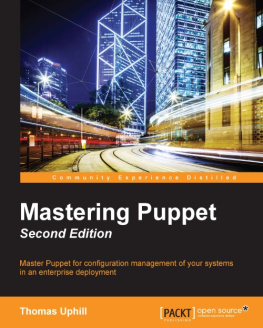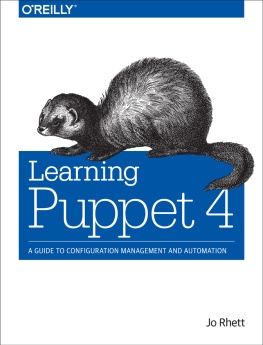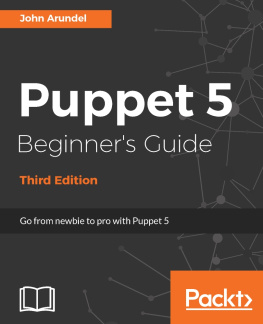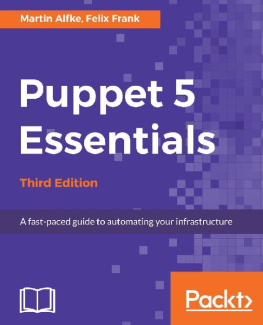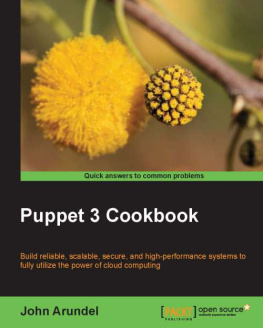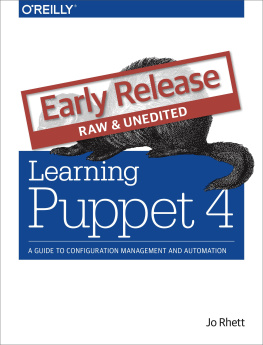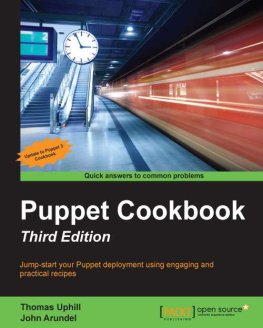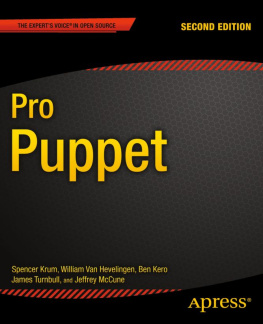Uphill Thomas. - Mastering Puppet
Here you can read online Uphill Thomas. - Mastering Puppet full text of the book (entire story) in english for free. Download pdf and epub, get meaning, cover and reviews about this ebook. genre: Computer. Description of the work, (preface) as well as reviews are available. Best literature library LitArk.com created for fans of good reading and offers a wide selection of genres:
Romance novel
Science fiction
Adventure
Detective
Science
History
Home and family
Prose
Art
Politics
Computer
Non-fiction
Religion
Business
Children
Humor
Choose a favorite category and find really read worthwhile books. Enjoy immersion in the world of imagination, feel the emotions of the characters or learn something new for yourself, make an fascinating discovery.
- Book:Mastering Puppet
- Author:
- Genre:
- Rating:3 / 5
- Favourites:Add to favourites
- Your mark:
Mastering Puppet: summary, description and annotation
We offer to read an annotation, description, summary or preface (depends on what the author of the book "Mastering Puppet" wrote himself). If you haven't found the necessary information about the book — write in the comments, we will try to find it.
.Puppet is a configuration management system and a language. It was written for and by system administrators to manage large numbers of systems efficiently and prevent configuration drifts.Mastering Puppet deals with the issues faced when scaling out Puppet to handle large numbers of nodes. It will show you how to fit Puppet into your enterprise and allow many developers to work on your Puppet code simultaneously. In addition, you will learn to write custom facts and roll your own modules to solve problems. Next, popular options for performing reporting and orchestration tasks will be introduced in this book. Moving over to troubleshooting techniques, which will be very useful. The concepts presented are useful to any size organization.By the end of the book, you will know how to deal with problems of scale and exceptions in your code, automate workflows, and support multiple developers working simultaneously.What You Will Learn:
Scale out your Puppet infrastructure using proxying techniques;
Automate your code promotion workflow using Git and r10k;
Solve real-world problems using public modules from the Puppet Forge;
Use Hiera to separate the data of your configuration from the code of your configuration;
Write your own custom facts in Ruby;
Extend Puppet with your own custom facts, modules, and types;
Use exported resources to orchestrate change between machines;
Debug a puppetserver using Java techniques.This book is an advanced guide to using and deploying Puppet 4 in your organization with a special focus on issues faced in larger enterprise deployments.
From an experienced author, learn to deal with scaling, performance, and multiple developers with the help of real-world examples.
This is the most up-to-date guide on Puppet, and covers the advanced concepts of Puppet 4.Who This Book Is For:
This book is for those who have intermediate knowledge of Puppet and are looking to deploy it in their environment. Some idea how to write simple modules for configuration management with Puppet is a prerequisite for this book. iPAD Amazon Kindle, PC , Cool Reader (EPUB), Calibre (EPUB, MOBI, AZW3), Adobe Digital Editions (EPUB), FBReader (EPUB, MOBI, AZW3).
Uphill Thomas.: author's other books
Who wrote Mastering Puppet? Find out the surname, the name of the author of the book and a list of all author's works by series.

